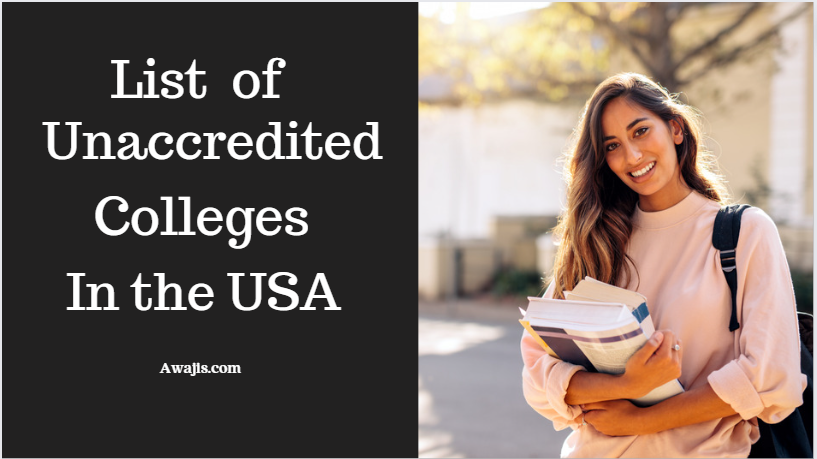Unaccredited Colleges in the US [2025 Update]
In the United States, a legal license for a college to operate is different from an educational accreditation. Hence, there are several colleges in the US that are operating but unaccredited.
It is worth noting that degrees from unaccredited colleges may not be accepted by employers in the public sector and industries.
There are many unaccredited colleges and institutions all over the place, particularly in the United States, and many people are unaware of this.

In this article, you’ll see a detailed list of unaccredited colleges in the US and also a list of fake online colleges in the US, and how to identify them.
But before then, what are the reasons why a college may be unaccredited?
Reasons why a College may be Unaccredited
An institution may not get or lose its accreditation for several reasons. Some of the common reasons are itemized below:
- A long-established institution may lose its accreditation due to financial difficulties or other circumstances.
- A new institution may not yet have attained accreditation.
- Several colleges, like some Bible colleges and seminaries, feel that the accrediting process violates their right to academic, political, or religious freedom, hence they decide not to take part in it.
- Religious institutions are immune from government supervision or accreditation in many jurisdictions.
- Some institutions are exempt from the need for accreditation.
- Accreditation is date-related: In the US, schools and universities usually don’t receive full accreditation until after they have been in operation for several years.
- Additionally, a large number of colleges and universities existed in the US before the creation of the current accreditation system.
Must See: Best Art High Schools in the US (2025 Update)
What exactly is Accreditation?
Accreditation is a “seal of approval” from a recognized group or a third party that certifies a school meets high educational standards. Several non-governmental, nonprofit organizations in the US conduct it essentially as a review procedure.
They assist us in determining whether educational programs, whether traditional or online, adhere to predetermined standards of quality.
By selecting an accredited college, you can be sure that you are receiving a high-quality education because the procedure is extensive and demanding. The majority of colleges have personnel tasked with controlling and managing the procedure.
Accrediting agencies are private organizations that aim to ensure that academic institutions under their jurisdiction satisfy acceptable educational quality standards. These organizations can accredit institutions on a national or international scale, or they may specialize in a particular location.
Many colleges and universities in the United States are accredited by a regional body; this is known as institutional accreditation.
Accrediting agencies can also accredit individual programs, a process known as programmatic accreditation. Remember that just because a program/course is accredited does not imply that the school is, and vice versa. Check to determine if any specific accreditations are available.
There are six key regional accrediting agencies in the US that are recognized by the US Department of Education and/or the Council for Higher Education Accreditation (CHEA).
List of Unaccredited Colleges in the US
Some institutions in the US are not accredited, even though the United States of America is home to some of the top colleges in the world that provide high-quality education to both its national and international students.
Below is a detailed list of unaccredited colleges in the United States:
Name of University |
Location |
Notes |
|
|
|
|
|
|
|
|
|
|
|
|
|
|
|
|
|
|
|
|
|
|
|
|
|
|
|
|
|
|
|
|
|
|
|
|
|
|
|
|
|
|
|
|
|
|
|
|
|
|
|
|
|
|
|
|
|
|
|
|
|
|
|
|
|
|
|
|
|
|
|
|
|
|
|
|
|
|
|
|
|
|
|
|
|
|
|
|
|
|
|
|
|
|
|
|
|
|
|
|
|
|
|
|
|
|
|
|
|
|
|
|
|
|
|
|
|
|
|
|
|
|
|
|
|
|
|
|
|
|
|
|
|
|
|
|
|
|
|
|
|
|
|
|
|
|
|
|
|
|
|
|
|
|
|
|
|
|
|
|
|
|
|
|
|
|
|
|
|
|
|
|
|
|
|
|
|
|
|
|
|
|
|
|
|
|
|
|
|
|
|
|
|
|
|
|
|
|
|
|
|
|
|
|
|
|
|
|
|
|
|
|
|
|
|
|
|
|
|
|
|
|
|
|
|
|
|
|
|
|
|
|
|
|
|
|
|
|
|
|
|
|
|
|
|
|
|
|
|
|
|
|
|
|
|
|
|
|
|
|
|
|
|
|
|
|
|
|
|
|
|
|
|
|
|
|
|
|
|
|
|
|
|
|
|
|
|
|
|
|
|
|
|
|
|
|
|
|
|
|
|
|
|
|
|
|
|
|
|
|
|
|
|
|
|
|
|
|
|
|
|
|
|
|
|
|
|
|
|
|
|
|
|
|
|
|
|
|
|
|
|
|
|
|
|
|
|
|
|
|
|
|
|
|
|
|
Fake Online Colleges/Universities in the US
Just like there are unaccredited colleges in the US, there are also several fake online universities and colleges.
Finding a fake online university is quite difficult due to the popularity of distance learning and the ease of access to online degrees, which allow you to acquire a degree from a well-known institution without having to visit the school location in person.
Below is a list of popular fake online colleges/universities:
- Concordia College and University.
- Madison University.
- American Central University.
- Christian Leadership University.
- Clarksville Theological School.
- American Management University.
- University of the Nations.
How to Identify a Fake Online College/University
Here is how to identify a fake online college or unaccredited university:
1. Familiar names
This is yet another warning sign that a US-based online university is fake. Scammers frequently use the names of certain prestigious colleges to create fake online degree programs.
For no other reason, than to deceive people into thinking they are associated with the institution, they prefix their names with “Harvard,” “Cambridge,” “Oxford,” or any other globally renowned university.
2. There is no “.edu” URL
A program with a “.com” or “.net” address should prompt a potential student to further investigate whether they issue fake degrees. However, note that “.edu.” URL is particularly used in the higher education sector in the United States.
3. There is no direct contact information
Another red flag that the online university program you are interested in is fake is when you cannot find the university’s official website, address, or phone number.
Also, there is a strong likelihood that the institution and the online courses offered there are fake if the contact email address or other information on the page looks a little suspicious.
4. Fake Accreditation Organization
If an online university’s accreditation status is unreliable, that is one indication that it is fake. A legal organization’s official certification of a university’s program’s compliance with a given standard of excellence is known as accreditation.
Also, every legitimate university must have national or regional accreditation from a Ministry of Education organization in that nation.
Some Fake Accreditation Bodies in the US
- International Accreditation Organization (IAO).
- International Council on Education (ICE).
- Association for Online Academic Accreditation.
- American Accrediting Association of Theological Institutions.
- American Association of Drugless Practitioners (ADP).
- Global Accredited Council for Business Association (GACBA).
- Distance Learning International Accreditation Association (DEIAA).
- Global Accreditation Council for Business Education (GACBE).
- American Council of Private Colleges and Universities.
- Distance Learning Quality Assurance Agency (DLQAA).
- Global Accreditation Council for Online Academia.
- International Commission for Higher Education.
- International Accreditation Agency for Online Universities (IAAOU).
- Association for Online Excellence.
- American Association for Higher Education and Accreditation (AAHEA).
- Accreditation Council for Distance Education (ACTDE).
- Accreditation Council for Online Academia (ACOHE).
- International Accreditation Commission for Online Universities (IACOU) (Kingston).
- International Accreditation Commission for Online Educational Institutions (IACOEI).
- American Association for Adult and Continuing Education (AAACE).
- Board of Online Universities Accreditation (BOUA).
- Council of Online Higher Education.
- Central States Consortium of Colleges & Schools.
- Distance and Online Universities Accreditation Council (DOUAC).
- Distance Learning Quality Assurance Agency (DLQAA).
- European Accreditation Board of Higher Education (EABHE).
- Global Accreditation Bureau (GAB).
- Accrediting Commission International (ACI).
- Association of Accredited Bible Schools.
- Distance Learning International Accreditation Association (DEIAA).
- Association of Distance Learning Programs (ADLP).
- Association of Private Colleges and Universities.
- Central American Council of Accreditation (CACA).
- Council for Distance Education.
- Accreditation Panel for Online Colleges and Universities (APTEC).
- Association for Online Academic Excellence.
- International Accreditation Association for Online Education (IAAFOE).
- Global Accreditation Commission for Distance Education (GACDE).
- International Accreditation Commission (IAC).
- International Association Council of Engineering Professionals (IACEP).
What happens if a College is Unaccredited?
Attending an unaccredited college/university may prevent you from receiving federal financial aid, transferring credits to another school, and obtaining an appropriate professional license in your field.
Also See: Best Medical Schools in the US (Comprehensive Report – 2025)
We hope you find this information helpful. Please use any of the share buttons below to share this information.
Feel free to drop any questions, comments, or contributions regarding this article in the comment section below.
